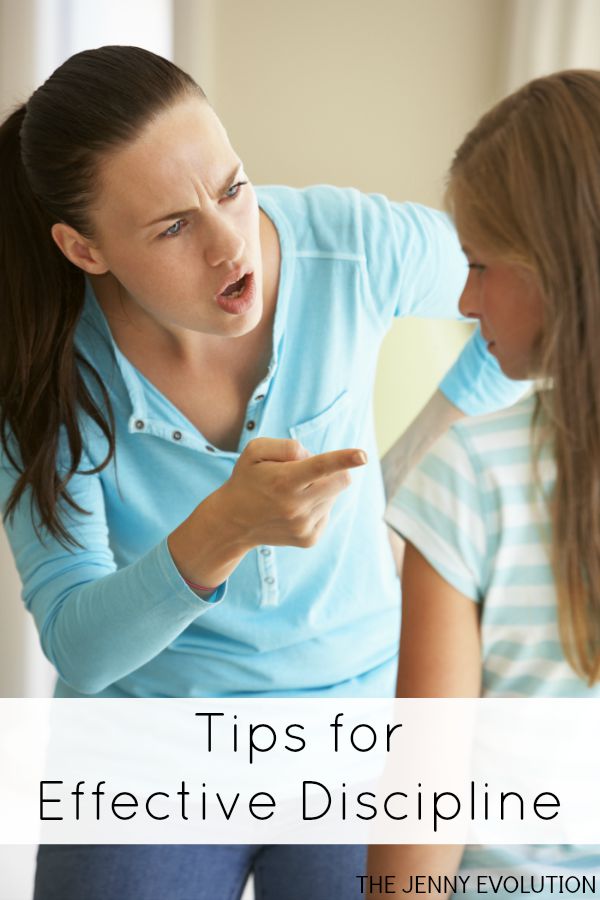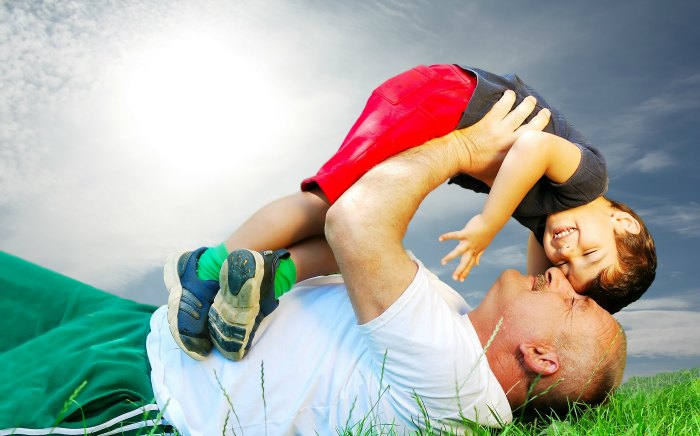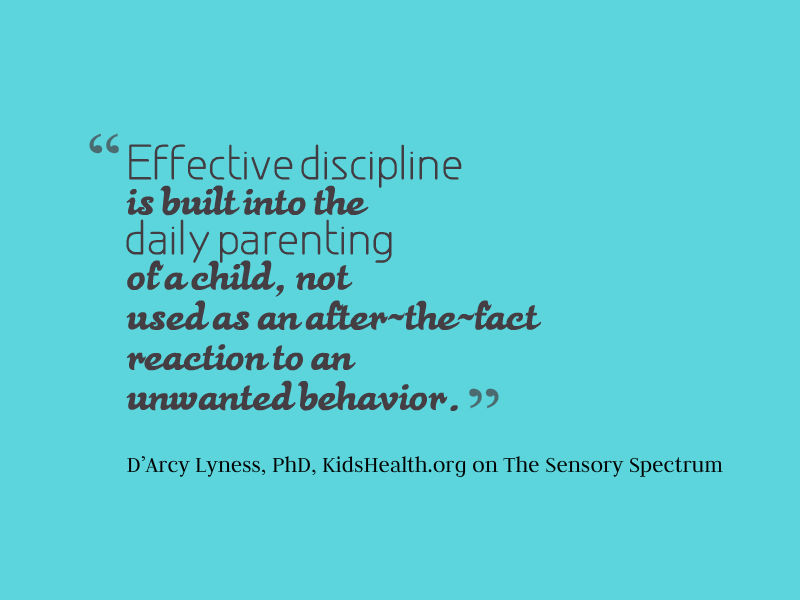Parenting Tips for Effective Discipline
Effective discipline for children seems to be in the news a lot lately.
It’s an important issue for those who care about children and parents.
Many parents think the word discipline is all about punishment — and especially about physical punishment.
But discipline really is about helping a child understand what to do — and learn how to self-regulate.
As parents (and particularly as parents of kids with sensory needs), we all understand that there is a fine line between supporting your child’s sensory needs behavior and understanding when it needs to be addressed.
Be sure to check out even more of my helpful parenting tips, too!

“The word discipline actually means to teach or to guide,” says D’Arcy Lyness, PhD, behavioral health editor for KidsHealth.org.
“It’s not about punishment — and certainly not about shouting, scolding, or physically hurting a child. Effective discipline is built into the daily parenting of a child — not used as an after-the-fact reaction to an unwanted behavior.”
Parenting (and discipline) that is emotionally warm, has high expectations for kids, and focuses on teaching children positive ways to act is far more effective — and far more rewarding — than parenting that focuses on punishment.
Physical punishment, like slapping or hurting a child, is never acceptable.
And not just because it’s wrong — it is also less effective than other methods.
Why?
A parent who hurts a child almost always does so out of frustration and anger.
It’s an out-of-control moment that sets a bad example for children.
No: Why Kids–of All Ages–Need to Hear It and Ways Parents Can Say It No-Drama Discipline: The Whole-Brain Way to Calm the Chaos and Nurture Your Child’s Developing Mind
No-Drama Discipline: The Whole-Brain Way to Calm the Chaos and Nurture Your Child’s Developing Mind No-Drama Discipline Workbook: Exercises, Activities, and Practical Strategies to Calm The Chaos and Nurture Developing Minds
No-Drama Discipline Workbook: Exercises, Activities, and Practical Strategies to Calm The Chaos and Nurture Developing Minds Anger Management for Parents: The ultimate guide to understand your triggers, stop losing your temper, master your emotions, and raise confident children
Anger Management for Parents: The ultimate guide to understand your triggers, stop losing your temper, master your emotions, and raise confident children
A parent who uses physical force might get a child to stop doing something for the moment, but risks damaging the parent-child relationship permanently.
“Children who are physically disciplined develop less self-control rather than more. They do worse in school and have more emotional problems than children who are disciplined in other ways. That’s just the opposite of what their parents intend,” according to Lyness.
Check out these great tips for parents looking to help their children learn better behavior and how to self-regulate from KidsHealth:
Have high expectations for good behavior
Just make sure your expectations match your child’s age.
For example, it’s unrealistic to expect a toddler not to touch things.
Toddlers naturally explore and touch everything within reach.
With that developmental reality in mind, parents can focus on toddler-proofing the home to make it safe, providing things to play with and explore, and being attentive and responsive.
If your toddler ventures toward something off-limits, protect and redirect him, rather than scold or punish.
Have clear rules and consistent routines
For preschoolers, have clear rules and consistent routines, and be proactive by patiently showing kids how you want them to behave.
Your everyday interactions ― from playtime to bedtime to mealtime ― are the perfect opportunities to show and tell your child how to behave in different situations.
Positive Discipline: The First Three Years, Revised and Updated Edition: From Infant to Toddler–Laying the Foundation for Raising a Capable, Confident How to Talk So Kids Will Listen & Listen So Kids Will Talk
How to Talk So Kids Will Listen & Listen So Kids Will Talk The Happiest Toddler on the Block: How to Eliminate Tantrums and Raise a Patient, Respectful, and Cooperative One- to Four-Year-Old
The Happiest Toddler on the Block: How to Eliminate Tantrums and Raise a Patient, Respectful, and Cooperative One- to Four-Year-Old Positive Discipline: The Classic Guide to Helping Children Develop Self-Discipline, Responsibility, Cooperation, and Problem-Solving Skills
Positive Discipline: The Classic Guide to Helping Children Develop Self-Discipline, Responsibility, Cooperation, and Problem-Solving Skills
Model positive cooperative behaviors, and be clear and firm about what’s OK and what’s not.

Look behind the misbehavior
Misbehavior isn’t always intentional.
Sometimes a preschooler is cranky because he’s hungry or sleepy.
Or perhaps the spilled water was part of young child’s experiment with water.
Looking at the misbehavior from your child’s perspective might affect how you react.
Respond to your child’s emotional needs with warmth and understanding
Give your preschooler opportunities to do things “all by himself,” but offer help as needed.
Use routines to help kids get into good habits like putting toys away, helping, sharing, saying sorry, cooperating when it’s bath- or bedtime.
Expecting and praising desired behaviors helps them become habits.
And practicing these habits helps kids develop self-help, and social and cognitive skills.

Firm but gentle action
When it comes to responding to a young child’s misbehavior, take firm but gentle action without too much talking or explaining.
Making too much of your child’s misbehavior, or reacting too emotionally, sometimes keeps it happening.
Avoid asking questions
Avoid asking questions, (‘why would you do that!?’) and avoid harsh words that disparage or shame your child (‘you are so selfish’).
And don’t be distracted by your child’s story about why he did what he did (“she started it!”).
Instead, stay focused on the specific misbehavior you want to correct.
Simply stop your child, and calmly (but firmly) say what’s not allowed (‘it’s not OK to grab her toy’). Then say what will happen next (‘you need to say you’re sorry for grabbing, and give her back the toy’).
When your child does that, offer brief praise (‘that’s better, thanks’).
Most times a longer punishment is unnecessary.
It can be more helpful to encourage your child toward a positive way to behave (‘OK, ready to get back to playing nicely together?’).

Manage your own emotions
It’s natural for parents to feel frustrated or angry when children misbehave.
Be aware of your emotions, but be in control of how you express them.
Remain calm and clear when responding to your child.
Avoid yelling or preaching.
Teach kids to manage their own emotional meltdowns by setting a good example.
Be Warm and Fair
When it comes to discipline, parents should be warm and fair…but firm and clear.
Don’t use threats, physical punishment, or consequences that are too harsh or out of scale with the misbehavior.
Have reasonable consequences for misbehavior, and carry them out calmly.

Help your child learn to problem-solve
Use approaches that help your child learn to problem-solve and to manage difficult emotions.
Some young children are more challenging than others, such as those who are often oppositional or uncooperative.
Help kids learn to cooperate with your requests by giving specific instructions (nicely), and breaking down tasks into small parts.
Teach cool-downs or use time-outs to help kids regroup.
Ignore your child’s protests whenever you can.
Stay calmly focused on what you expect.
Praise your child for self-reliant cooperative behaviors.
Teach your child to know and name emotions and to tell you how he feels and why.
Reach out for help and support
Your support network may include family members or friends.
But also consider talking to your child’s doctor, nurse, teacher, or a child therapist.
Take a parenting class.
Read.
Talk to other parents who are successful at raising children without having to use physical force.

Above all, be patient
Being a parent is a difficult job.
But raising a happy child who is socially and emotionally equipped to be successful in life is probably the most important (and rewarding) job a parent can have.










The Pinterest button on your posts does not seem to be working,
Oof. thanks for letting me know. Can you tell me if it’s working for you now???